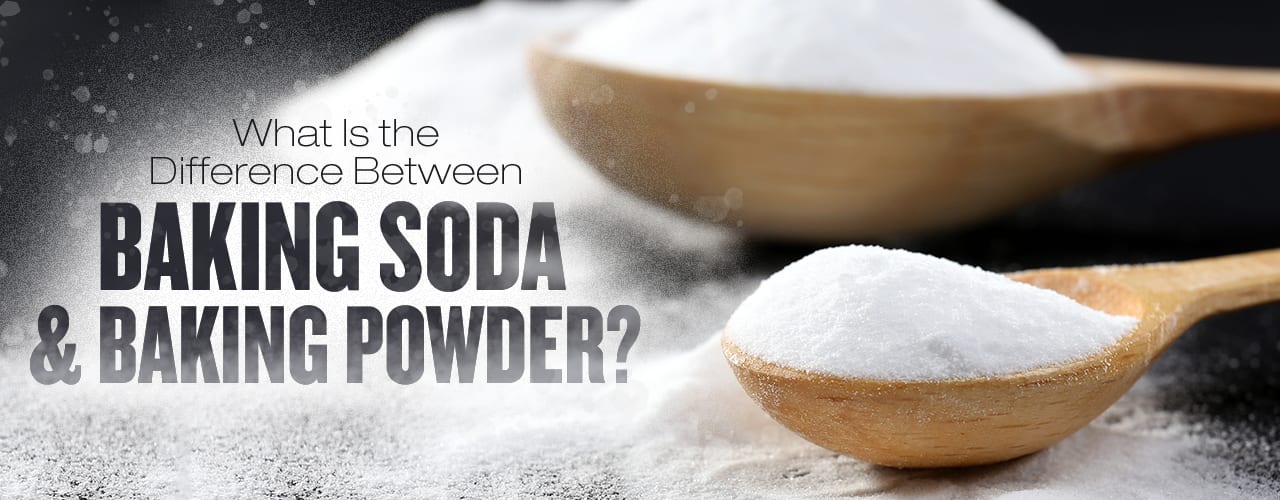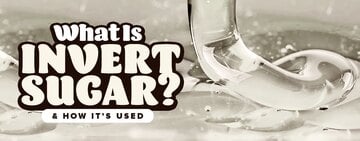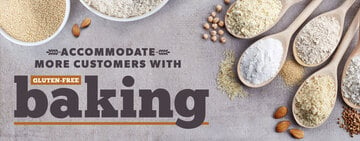Is Baking Soda the Same as Baking Powder?
Whether you own a bakery, offer baked goods on your menu, or just have a casual interest in baking, it’s essential to understand the difference between baking soda and baking powder. In the blog below we’ll explain what sets baking soda and baking powder apart, how they work, and the different substitutes you can use in their place.
Baking Soda vs Baking Powder
The difference between baking powder and baking soda comes down to their ingredients. Baking soda only contains one ingredient, sodium bicarbonate. On the other hand, baking powder is made up of two ingredients: sodium bicarbonate and some form of powdered acid. In most cases, that acid is potassium bitartrate, also known as cream of tartar.
How Baking Soda Works
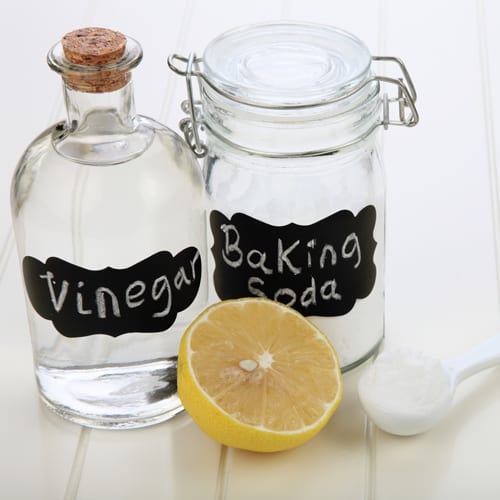
Baking soda undergoes a chemical reaction when mixed with an acidic ingredient. This reaction only takes place in the presence of moisture and produces carbon dioxide gas, which helps your batter or dough to rise and appears as air bubbles in the recipe. Once you’ve added baking soda to your dough, it’s best to bake it as soon as possible as the carbon dioxide will eventually escape. If this happens long enough, it can prevent your baked goods from rising.
The list of ingredients that can help induce this reaction includes:
- Lemon juice
- Buttermilk
- Yogurt
- Honey
How Baking Powder Works
Similarly to baking soda, the activation process of baking powder produces carbon dioxide gas that helps raise your batter or dough. Unlike baking soda, baking powder already contains an acidic ingredient. Because of this, it only requires water to activate.
It’s important to note that some baking powders are double-acting. This means that they will activate a second time when introduced to heat. Because of this second activation, you don’t need to rush to get your baked goods in the oven when you’re using double-acting baking powder.
Baking Powder Substitute
While it’s possible to substitute baking powder in your recipes, any ingredient used in its place will not be as effective. Regardless, if you don’t have access to baking powder, you may need to find a convenient alternative. Below, we’ve listed some ingredients commonly found in kitchens that can act as a suitable substitute for baking powder.
- Buttermilk and baking soda: As a fermented dairy product, buttermilk can have a similar leavening effect as baking powder when combined with baking soda.
- Cream of tartar: Created as a byproduct of the wine-making process, cream of tartar is an acidic white powder. Combining it with baking soda allows you to mix an excellent replacement for baking powder.
- Lemon juice: With a high concentration of citric acid, lemon juice is acidic enough to trigger a leavening effect when combined with baking soda. Keep in mind that it should only be used in small amounts to avoid giving your recipes a lemon flavor.
- Molasses and baking soda: Typically used as a sweetener, molasses can cause an acid-based reaction when combined with baking soda, making it an effective substitute for baking powder.
- Sour milk: Because of its diminished pH levels, sour milk reacts with baking soda to produce a similar leavening effect as baking powder.
- Vinegar and baking soda: Vinegar, which has an acidic pH, can be a possible substitute for baking powder when paired with baking soda.
Baking Soda to Baking Powder Conversion
For every 1 teaspoon of baking soda, substitute 3 teaspoons of baking powder.
Baking Soda Substitute
Though some recipes can still be prepared without baking soda, it's best to make sure you have a suitable replacement on hand just in case. Remember that a baking soda reaction requires acid to activate, so it's essential to have acidic foods on hand during the process. Below, we've listed some baking soda substitutes that you might find around the kitchen:
- Baking powder: Baking powder is one of the most common substitutes for baking soda. It’s best to use it as a substitute in sugar-based recipes. In the section below, we’ve included a baking soda to baking powder conversion.
- Self-rising flour: Though the conversion can be tricky, self-rising flour can serve as a substitute for baking soda. It is made of a combination of all-purpose flour, baking soda, and salt.
- Egg whites: In some cases, egg whites can serve as a viable replacement for baking soda. Whipped egg whites can help add structure to your recipe, but must be folded in gently to avoid agitating the batter.
- Club soda: As it contains a small amount of baking soda, club soda can sometimes be used as a substitute in a pinch. It's important to note that club soda will only work as a replacement for recipes that require minimal rising.
Baking Powder to Baking Soda Conversion
Use 1 teaspoon of baking soda for every tablespoon of baking powder. To make sure it functions correctly, also add 2 teaspoons of vinegar, lemon juice, cream of tartar, or another acidic ingredient to your batter or dough. One drawback to using baking powder as a substitute is that it isn't double-acting. With that in mind, be sure to get it in the oven as soon as possible after you combine it with wet ingredients.
How Long Does Baking Soda Last?
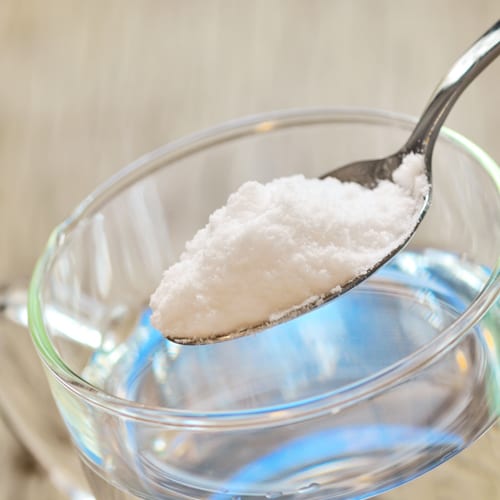
In general, an unopened package of baking soda can be stored at room temperature for up to 18 months. However, once the package has been opened, its shelf life is reduced to 6 months. Environmental factors can speed up the rate at which ingredients lose their effectiveness, making it essential that you store your baking soda in a suitable space.
How to Test Baking Soda
To test baking soda, mix 1/4 teaspoon of baking soda with 2 teaspoons of vinegar. It should bubble immediately if your baking soda is useable.
What Happens If You Use Expired Baking Soda?
Baking soda can still be used after its expiration date, though it won't work as well as fresh baking soda. Despite its reduced effectiveness, expired baking soda is still safe to consume.
How Long Does Baking Powder Last?
An unopened package of baking powder can typically be used until 18-24 months after manufacturing. However, for the best results, it’s recommended that you use your baking soda before expiration.
How to Test Baking Powder
To test baking powder, mix 1 teaspoon of baking powder with 1/2 cup of hot water. If it bubbles, your baking powder is still effective.
What Happens If You Use Expired Baking Powder?
Expired baking powder is safe to consume, but using it in your recipes can cause baked goods to come out flat or dense.
Baking Soda and Baking Powder FAQ
In the section below, we've answered some of the most frequently asked questions about baking powder and baking soda.
How to Store Baking Soda
Since baking soda absorbs odors and moisture, it's best to store it in a cool, dry location. The best temperature for storing baking soda falls somewhere between 40-70 degrees Fahrenheit. Once you’ve opened a package of baking soda, be sure to store it in an air-tight and moisture-proof container to preserve freshness.
How to Store Baking Powder
Similar to baking soda, baking powder should be stored in a cool, dry location. Avoid storing it in a refrigerator, as it’s possible moisture could develop and cause a reaction within the baking powder.
What Is a Leavening Agent?
A leavening agent, sometimes referred to as a leavener or a rising agent, is used in baking to expand doughs and batters. When mixed with liquid, acid, or heat, they release gas, causing the dough to rise.
Many people say that baking is a science, and how baking soda and baking powder work as chemical leavening agents is an excellent example of science at work in your kitchen. Recipes use these ingredients to give your baked goods the perfect texture brought on by chemical reactions and carbon dioxide gas. As a result, precision is key when working with baking soda and baking powder. Next time you use one of these ingredients, remember our storage tips and directions for how to make sure that your baking soda or baking powder is still working.
